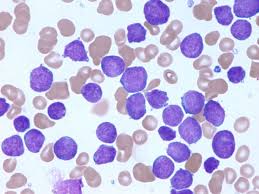
Ph+ ALL is the most frequent genetic ALL subgroup in adults.
It counts for 25 t0 30% of all ALLs in adults overall and progressively more frequent with age.
Ph+ ALL is less common and young adults and accounts were approximately 50% of all ALL in adults older than 50 years.
Approximately 30% of adults with ALL have the T (9; 22) translocation and or rearrangement of BCR:ABL1.
Ph+ ALL is much rarer in children.
Ph+ ALL was the most lethal condition in hematology, until the introduction of TKIs.
Positivity in adults with ALL was associated with a 5-year survival rate of less than 10%.
The PH Chromosome abnormality is rare in children with ALL with an incidence of 2 to 5%.
The presence of BCR-ABL rearrangement is the worst prognostic factor for ALL.
Children with positivity of Philadelphia chromosome in ALL treated with chemotherapy have survival rates of 25-30% and worse outcomes with WBC counts greater than 100,000.
Long-term survival of patients with Philadelphia chromosome positive ALL treated with imatinib and intensive chemotherapy have improved event free survival compared with historical controls treated without imatinib and comparable to patients treated with allogeneic stem cell transplant: five year disease free survival around 70%.
Prior to the introduction of tyrosine kinase inhibitors (TKIs) the response to chemotherapy was limited and the survival rate for patients with adult PH positive ALL was in the range of 10 to 20%.
Intrathecal chemotherapy is part of the management of patients with Philadelphia positive ALL.
Combination of TKI with chemotherapy is up to five years survival rate of 75% with third generation TKI(Ponatinib).
Ponatinib is superior in efficacy and comparable in safety versus imatinib for frontline treatment of adults with newly diagnosed Philadelphia chromosome, positive ALL.
Ponatinib demonstrates superior MRD negative complete remission at the end of induction versus imatinib when combined with reduced intensity, chemotherapy in adults with newly diagnosed filled for Philadelphia positive ALL (PhALLCON).
Outcomes with imatinib and dasatinib are not optimal because of the acquisition of certain mutations, including the T 3151 mutation: most patient with these agents fail due to acquisition of this mutation.
These agents also do not induce a deep molecular response as ponatinib, needed for optimal outcome.
The bispecific monoclonal antibody blinatumomab targets two antigens, CD19 an antigen present in virtually all B lineage ALL cases, and CD3, which is present in all T lymphocytes.
The combination of TKIs and blinatumomab lead to very high response rates of as high is 98% with 29% molecular responses.
Blinatumomab and inotuzumab are approved for management of relapsed Philadelphia chromosome positive ALL.
Ponatinib in combination with an immunotherapy agent blinatumomab have demonstrated complete molecular response rates of 83% and MRD negativity of 98% with an estimated three year overall survival of 91%, and mostly without subsequent allogeneic stem cell transplant.
Promising results obtained with chemotherapy free regimens of Blinatumomab plus TKIs question the role of allogeneic stem cell transplant in first remission, as patients treated with these agents achieve early and deep molecular responses and have excellent long-term outcomes.
TKIs have the ability to target and inhibit the auto phosphorylation caused by the BCR-ABL 1 kinase protein.
The use of TKI plus blinatumomab combinations most patients with Philadelphia chromosome positive ALL may be able to avoid hematopoetic stem cell transplant and chemotherapy.
Blinatumomab is a CD3-CD 19 bispecific T cell engaging antibody approved as a single agent for patients with relapsed or refractory B cell ALL and for those with MRD positive B cell ALL.
Blinatumomab as monotherapy is active impatience with Philadelphia positive ALL, including those with prior stem cell transplant, and ponatinib exposure.
Studies suggest molecular responses in patients with Philadelphia positive ALL is more rapid when second generation TKIs are combined with chemotherapy than with first generation TKI imatinib is used.
Ponatinib is a 3rd generation TKI is a BCR-ABL1 inhibitor and is efficacious in Philadelphia positive ALL and is particularly beneficial when combined with other agents and regiments.
Tisagenlecleucel CAR T cell therapy is a third line therapy for recurrent disease.
MRD plays a key role in prognosis and treatment decisions.
